GRIPS presents a new educational model for producing leader of leaders
Through the G-cube program, GRIPS aims to produce a new type of leaders for government, business, and international arenas. The program will equip its participants with (1) a broad historical perspective, which will help them understand the true nature of policy issues and predict their overall impact, (2) strong analytical ability needed to develop insightful and effective policies, and (3) effective communication skills to convey ideas and opinions across languages, cultures, religions, and nationalities
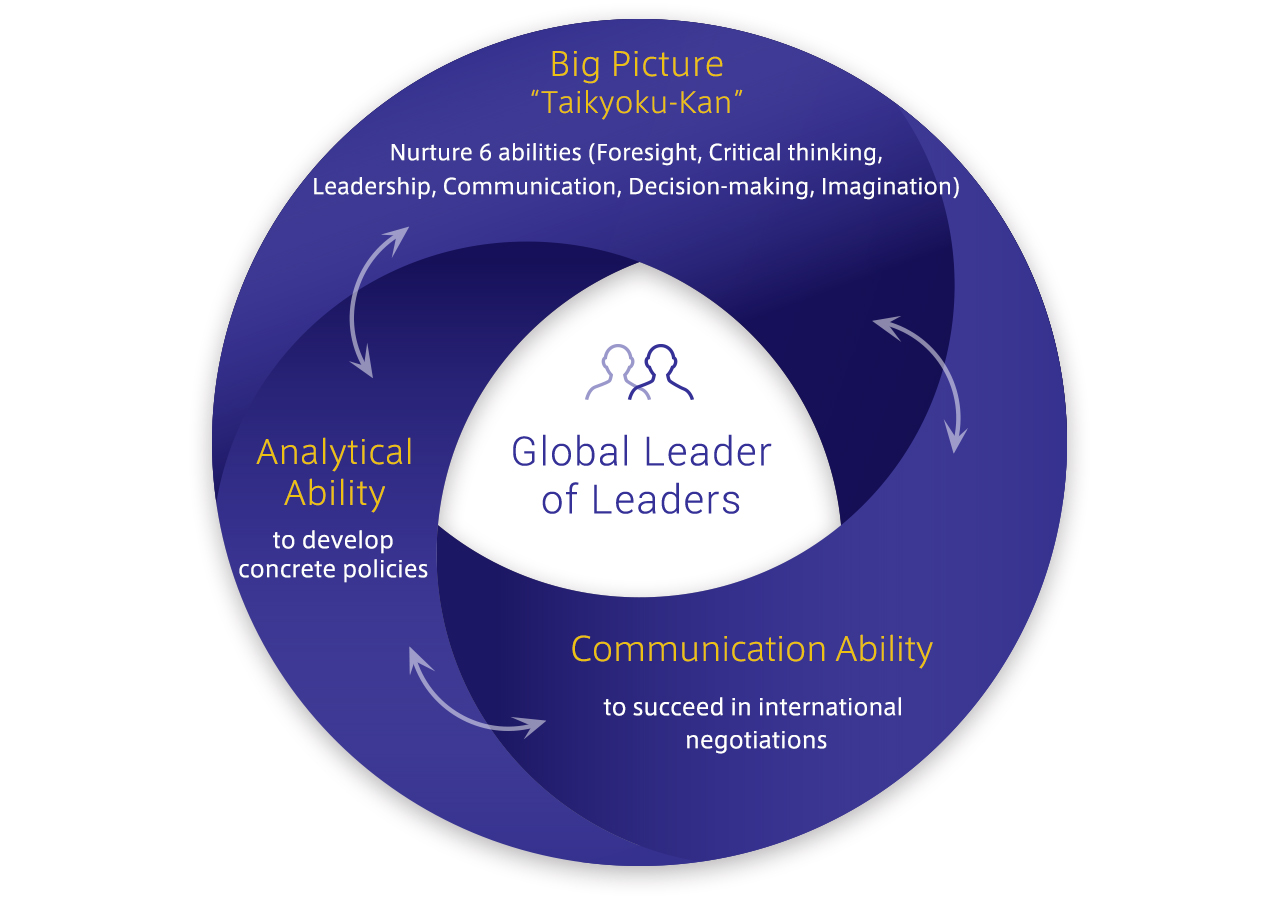
![]() Small-group tutorials are compulsory for this program
Small-group tutorials are compulsory for this program
A tutorial is an intensive, interactive teaching style where one professor is assigned to a small group of two to five students. Participants in the tutorial deepen their knowledge on the specific theme through discussions and presentations. Through analysis, counterarguments, criticism and intensive discussions with one another, as well as with the professor, students acquire
in-depth knowledge of various individual policy issues and strong analytical skills. In addition to the discussions, importance is placed on writing, thinking, predicting, and communicating, which are required to establish and nourish a broader perspective. Students must choose and complete more than three tutorials from at least two of the four policy issue clusters: global issues, developed countries, emerging countries, and developing countries.
Executive Seminar
The Executive Seminar is compulsory for students in the doctoral course. In addition to the professors responsible for this program, experts from political, official, economic, and academic backgrounds, both domestic and international, are invited as lecturers so that students have an intensive study-camp opportunity. Students not only attend lectures on contemporary issues, but also attend tutorial style or role-play group discussions and participate in group work to acquire the six abilities (predicting, thinking, communicating, leading, deciding and describing) required to develop a broader perspective.
Round 1
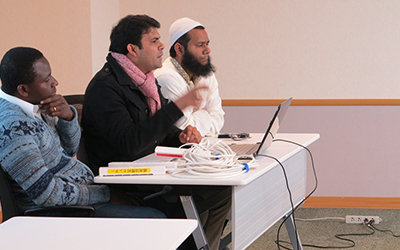
Students argued their groups’ points in Round 1
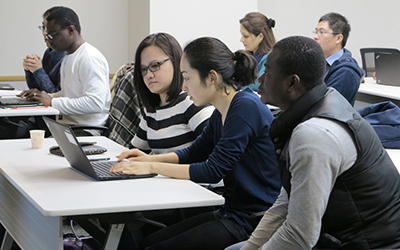
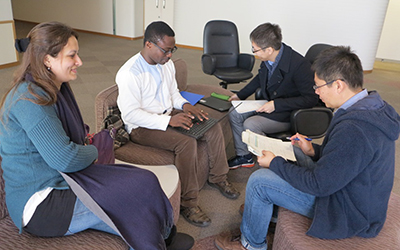
Strategizing: what points can be conceded?
Round 2
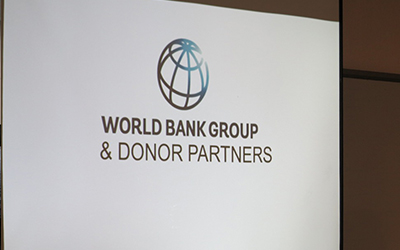
Round 2 begins
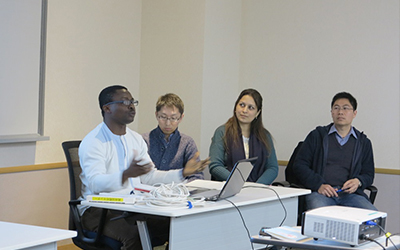
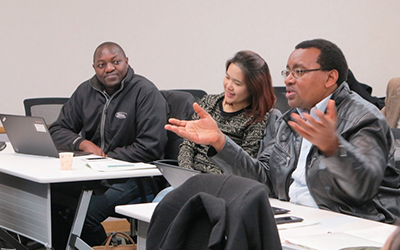
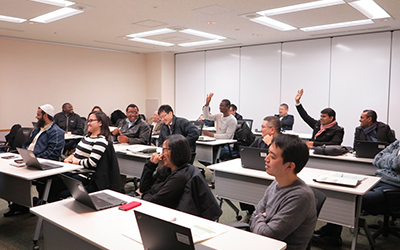
The “press” become good at making tough questions, and the discussion heats up
What the students say
“The G-cube Executive Seminar is an example of the usage of interdisciplinary approach in formulating policies and solving the challenges of our time. Our last Seminar thoroughly discussed the issue of accountability and corruption (which often plague developing countries), through the academic, practitioners, business, civil society and bureaucratic lenses.”
“I mostly enjoyed the 360 degrees perspectives and the pragmatic discussion held throughout the Seminar, given the various nationality, professional background and rich experiences of the participants. The Seminar also provided an opportunity to hone my analytical ability and practical skills through the role playing session, mock press conference and multiparty negotiation.”
Tutorial
A tutorial is an intensive, interactive teaching style where one professor is assigned to a small group of two to five students. Participants in the tutorial deepen their knowledge on the specific theme through discussions and presentations. Through analysis, counterarguments, criticism and intensive discussions with one another, as well as with the professor, students acquire in-depth knowledge of various individual policy issues and strong analytical skills.
In addition to the discussions, importance is placed on writing, thinking, predicting, and communicating, which are required to establish and nourish a broader perspective. Students must choose and complete more than three tutorials from at least two of the four policy issue clusters: global issues, developed countries, emerging countries, and developing countries.
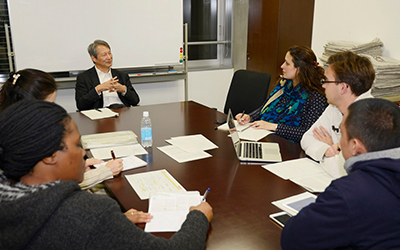
Since the classes are small, the distance between professor and students is very close. It is tough for the students, but also stimulating. The tutorials are very popular so that students from other programs sometimes ask if it they can sit in.
What the students say
In my tutorial, participants are expected to read journal articles proposed by students and submit a summary in order to prepare a discussion during the class. Discussion topics are varied. In addition to studying and understanding the contents of the papers in depth, we discuss on how to improve the articles and/or how to apply them to actual policy making (policy implication). It is very challenging because different opinions are expressed, and students are always expected to actively participate in the discussion. Your efforts are rewarded in terms of rich learning, so this is one of my favorite classes.”
“The tutorials offered at GRIPS have been very useful for me as these have broadened my horizon and have geared my research in the right direction. Most attractive feature of tutorials is that they are specially tailored and carefully designed according to the academic requirements of the participating students. The learned professors give students opportunity to discuss their minds freely and openly which becomes a unique learning experience. Because of discussions in tutorial sessions, I have been able to think objectively and grand-strategically about varying situations countries and institutions face on regional and international level.”
Policy Debate Seminar
The Policy Debate Seminar is held in the Winter and Spring terms to foster the ability to think from a variety of different perspectives through practical training, including writing, presentations, and debates. A former chief economist of the World Bank and political leaders are invited as guest lecturers, and they provide lectures and workshops with simulations of crisis management. The seminar gives students an opportunity to develop skills in intellectual discussion and communication with a large number of people in an understandable way, despite differences in language, culture, history, specialization, and nationality.
In the Academic Year 2015…
We invited Dr. John Martin Page Jr., a Senior Fellow of the Brookings Institution during the winter term. Dr. Page was a former Chief Economist of Africa Region at the World Bank. He was the principal author of the famous WB report The East Asian Miracle: Economic Growth and Public Policy, and has contributed much to the economic development assistance of developing countries through poverty alleviation policy-making as the World Bank’s star player.
In this course, on the topic of “industry and development: opportunities, constraints and public policy”, Dr. Page analyses industrial policies in Asian and African countries, and compares the regional policy differences through active discussion.
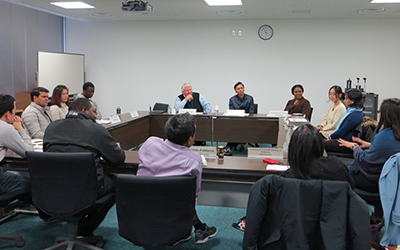
What the students say
“What I find insightful about the lectures is that Dr. Page combines both a historical perspective and Economic perspective of the issue discussed (say Poverty, Industrialization) and clearly articulates how this has evolved over time, what is happening now, what will happen in the future and also gives indicators and solutions to impending solutions. He combines both theoretical and empirical studies while discussing each topic. “
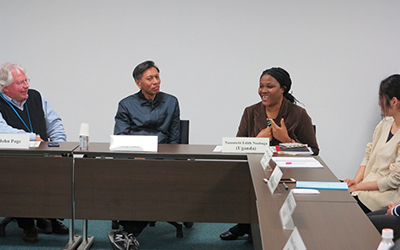
“Dr. John Page is versatile in giving insight to the real issues being faced globally and that is also reflected in his lectures. The diversified approaches in ‘Industry and Economic Development’ while linking employment opportunities, poverty alleviation, and economic growth with the trade and industry in the global perspectives specially relating it differently to different parts of the world based on socio-political environment is highly remarkable. Having the rich experience, while being at the important positions of international organizations, the Professor enriches the enlightenment of the course participants about the alternative approaches of the policy making to cope with the problems faced by world in general and developing countries in particular. The course is challenging in a way that it motivates the participants to explore the potential to develop expertise for working as global leader.”
“It is not only contents of the lecture that I find interesting, but also our professor who draws our attention with his teaching skills. By turning those complex contents into logical yet simple concept, it encourages me to learn from this class and it helps broaden my perspective about economic development.”
Special Lectures
We invite distinguished lecturers from within and outside of Japan, leaders in various fields and specialists who have been involved in policy-making. They deliver lectures with relevancy to current problems based on their own experiences, sharing their personal experiences with our students.
Here are some of the lecturers we have invited in the Academic Year 2015:
- Prof. Peter J. Katzenstein, Walter S Carpenter, Jr. Professor of International Studies, Cornell University
- Prof. Ginandjar Kartasasmita, Former Member of the Advisory Council of the President of the Republic of Indonesia; Former Coordinating Minister for Economic Affairs, Finance and Industry
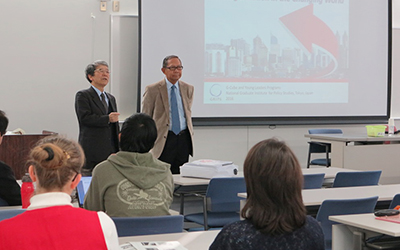
- Prof. Thanong Bidaya, Former Minister of Finance of the Kingdom of Thailand
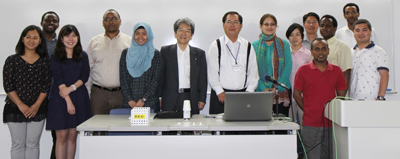
- Mr. Hideto Nakahara, Member of the Board, Senior Executive Vice President,
- Global Strategy & Business Development, Mitsubishi Corporation
- Mr. Masahiro Sakane, Councilor of Komatsu
- Mr. Hiroshi Watanabe, Governor of the Japan Bank for International Cooperation, Former Vice Minister of Finance for International Affairs

- Mr. Kazuhiro Maruyama, Chairman, Toray Medical Co., Ltd., Former Executive Director of Toray Industries Inc.
- Mr. Masaki Ogata, Vice-Chairman, East Japan Railway Co.
- Mr. Junichi Namiki, Woodside Energy Australia Asia Holdings Pte. Ltd. Senior Asia Advisor, Former Director of Tokyo Gas Co.,Ltd
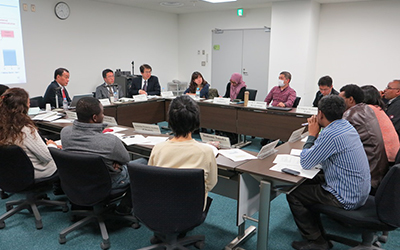
- Mr. Yoshiki Chishima, Board, Takane Gakuen, Former President of International In-Flight Catering Co., Ltd., Japan Airlines
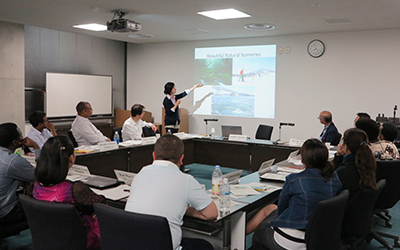
- Mr. Kiyoshi Yoshida, Board, Japan Science Foundation, Former Executive Director of Hitachi Ltd.
and others…
What the students say
“The lecture was very useful especially on the importance of management in the organization”
“All the lectures were useful and provided a great opportunity to interact with top-notch professionals from relevant sectors in Japan”
“I might try to look also into the involvement of the corporate sector for my dissertation after this presentation”

